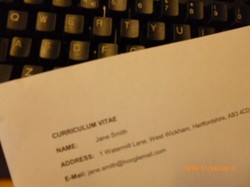This dilemma never seems to get any easier as we progress in our careers, but the key is to prioritize your job duties, or responsibilities according to your career goal, or professional objective.
Prioritize...
Often when we are asked about our job duties, or main responsibilities, the first things that come to mind are the things we did every day - the routine mundane items.
Unfortunately, these items rarely reflect the important responsibilities of the job, nor the skills we needed to acquire out te job effectively.
As well, listing the routine things first often leaves the key responsibilities and qualifications at the bottom of the list, not highlighted at or near the top.
Anyone who is familiar with that type of job will already know about the routine duties. They aren't interested in the routine things that they will assume you should be able to do, so they will most likely be interested in what else you bring to the table. They will want to see those skills highlighted.
Conversely, anyone who is unfamiliar will not know which are most important, so they may assume the key qualifications are listed first, and so overlook more important skills you possess. Again, you need to highlight the important things for them, too.
This could be a costly mistake, as most managers, or reviewers of resumes, spend as little as seven seconds looking over resumes. If they don't see what they are looking for in a candidate almost immediately, they discard that resume and go on to the next.










 Summer in the Land of the Midnight Sun: Lush gardens, beautiful flowers, small town livingon 07/27/2012
Summer in the Land of the Midnight Sun: Lush gardens, beautiful flowers, small town livingon 07/27/2012
 White Rock, B.C. - Tourist Mecca In Any Seasonon 06/13/2012
White Rock, B.C. - Tourist Mecca In Any Seasonon 06/13/2012
 How To Answer the Hardest Interview Questions and Get The Job You Wanton 06/07/2012
How To Answer the Hardest Interview Questions and Get The Job You Wanton 06/07/2012
 Golden Ears Provincial Park: Fun, fabulous, family-friendly travel destinationson 06/10/2012
Golden Ears Provincial Park: Fun, fabulous, family-friendly travel destinationson 06/10/2012


Comments
That''s an interesting comment, Rose. I don't think I have ever seen that on a resume. Usually employers are more interested in what you have done and where you've worked than in how much someone else paid you. In fact, your highest paying job may bear little relevance to the position for which you are currently applying, and you would NEVER mention salary expectation in your resume.
I would list your highest paying job first. Employers look at your most recent pay when deciding what salary to offer you.